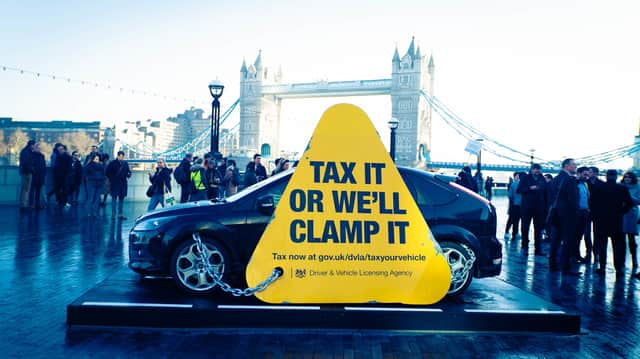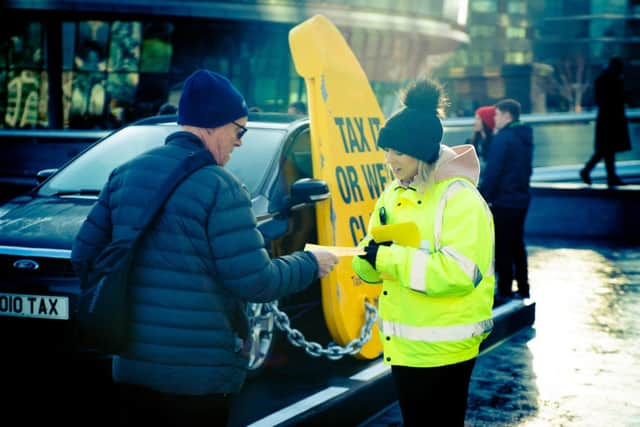DVLA reveals cities facing campaign to crack down on car tax evasion


The DVLA has announced a targeted campaign aimed at cracking down on car tax evasion, singling out the towns and cities around the UK with the worst records.
The campaign is targeting drivers in the 20 regions of the UK where vehicle tax evasion is higher and where more than half a million enforcement actions were taken last year.
Advertisement
Hide AdAdvertisement
Hide AdThe publicity drive is aimed at warning tax dodging drivers of the potentially expensive consequences of being caught breaking the law. It comes as new figures reveal that the number of enforcement actions over untaxed vehicles has doubled since the abolition of paper tax discs.


Using an image of a giant wheel clamp at its centre, the campaign warns that drivers who fail to tax their vehicle or make a statutory off road declaration risk fines of up to £1,000, and their vehicle being clamped or even impounded and crushed.
Worst offenders
Announcing the regions it will be targeting, the DVLA revealed the towns and cities where drivers are most likely to avoid paying car tax. In total it took nearly 590,000 enforcement actions in 2019.
Top of the table is Belfast, where the licencing body took 78,501 actions in 2019. It was significantly busier there than anywhere else, with just over 61,000 actions taken in Birmingham, the city with the second most offences.
Advertisement
Hide AdAdvertisement
Hide AdGlasgow (34,375), Manchester (34,106) and Sheffield (30,467) complete the top five areas for actions.
UK's biggest car tax offenders
Area
Total Enforcement Actions in 2019
Belfast
78,501
Birmingham
61,531
Bristol
24,747
Cardiff
28,857
Coventry
23,739
Doncaster
17,885
East London
26,005
Edinburgh
24,779
Glasgow
34,375
Leicester
23,174
Manchester
34,106
Newcastle
22,996
Northampton
18,729
North London
24,766
Nottingham
26,134
Peterborough
23,271
Romford
18,325
Sheffield
30,467
South London
29,336
Swansea
18,237
The campaign is also warning drivers that it is able to trace untaxed vehicles via its digital records and enforcement teams using vehicles equipped with number plate recognition cameras.
The DVLA’s chief executive, Julie Lennard, said: “The number of untaxed vehicles on the road is falling, but we are determined to reduce this even further. We operate a range of measures to make vehicle tax easy to pay and hard to avoid, so there really is no excuse if you fail to tax your vehicle. While the vast majority of motorists do the right thing and tax correctly, this campaign highlights the real consequences that motorists face if they don’t tax their vehicles”.
RAC spokesman Simon Williams added: “While the vast majority of motorists abide by the law and tax their vehicles correctly, high-profile enforcement campaigns like this are needed to make sure the consequences of not doing so are fully understood. This DVLA campaign gives a very clear warning of the action that will be taken on untaxed vehicles. Having your vehicle clamped is expensive and inconvenient so it’s far simpler to make sure you tax it.
Advertisement
Hide AdAdvertisement
Hide Ad“You can easily check when your tax is due using DVLA’s vehicle enquiry service on GOV.UK: all you need is your vehicle registration. It’s also really important to tell DVLA straightaway if you move house, so you don’t risk missing the reminder letters that DVLA sends to all vehicle keepers”.
How to check if your car is taxed
The DVLA campaign is targeting major cities, including Belfast, Edinburgh, Glasgow and Manchester
You should receive a reminder through the post around three weeks before your car’s tax is due. However, if you’re unsure whether your car is tax you can use the DVLA’s online tool. All you need is the car’s registration and the site will tell you when the tax is due as well as when the next MOT is due.
Since the abolition of the paper disc vehicle tax has not been transferred with the sale of a vehicle, meaning you will need to tax any car before you begin to drive or risk being hit with a fine.